AUGUST 26, 2015
Happy endings at Southwest Wildlife
A Bobcat Tail – 'Bubba'
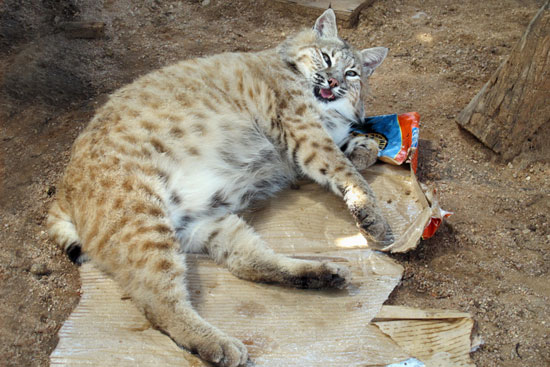 Bubba is a bobcat who was purchased from a breeder by an Arizona resident, who had him declawed and kept him as a pet. She knew it was illegal to keep a wild animal in Arizona, so Bubba was kept indoors and confined to a metal dog crate that became much too small for him as he grew. She didn’t know the proper diet for a bobcat kitten, so Bubba developed metabolic bone disease and, due to the lack of sufficient calcium in his diet, his bones became extremely weak.
Bubba is a bobcat who was purchased from a breeder by an Arizona resident, who had him declawed and kept him as a pet. She knew it was illegal to keep a wild animal in Arizona, so Bubba was kept indoors and confined to a metal dog crate that became much too small for him as he grew. She didn’t know the proper diet for a bobcat kitten, so Bubba developed metabolic bone disease and, due to the lack of sufficient calcium in his diet, his bones became extremely weak.
Bubba ultimately got three of his legs caught in the wire of the crate. During his attempts to free himself, he broke both hind legs and one front leg. Unfortunately, he was not provided proper veterinary treatment for these broken legs. He also suffered head trauma due to an unknown cause and was so obese, as a result of being fed pork fat he couldn’t walk. By the time his owner finally turned Bubba in to authorities, he was severely disabled from the badly healed broken legs and required daily medication to reduce the tremors and head tilt resulting from the head trauma.
We placed him on a low fat diet, and after months he started walking again. After spending his first few years entirely indoors, we had high hopes that Bubba would finally be able to enjoy the warmth of the sun on his fur by living the remainder of his life in one of our outdoor enclosures. We were saddened to discover the long-term effects of his head trauma have prevented this. In addition, his disabilities have precluded him from living with other sanctuary bobcats.
Therefore, we have created a special climate controlled indoor/outdoor ‘Presidential Suite’ for Bubba. From his suite he is able to access the outdoors anytime he likes.
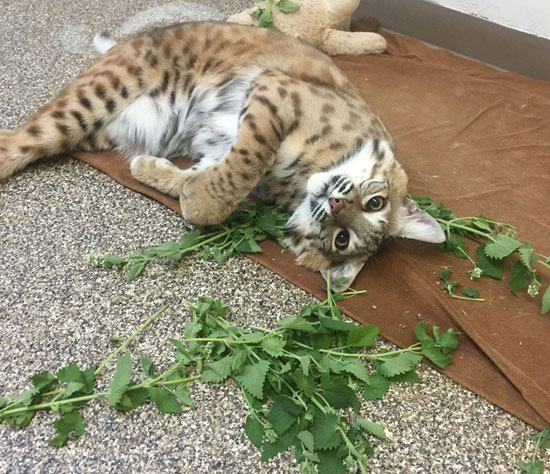
A ‘happily-ever-after’ ending for a beautiful cat.
Coyote Pups – ‘Thinking outside the box’
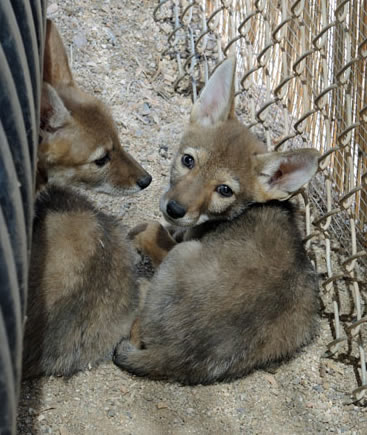 Every year, like clockwork, the coyote orphans arrive. One or two at a time they trickle in throughout the late spring and early summer months. Most of the puppies we get are several weeks old, with their eyes open, and they already know they’re coyotes and people are scary. With a little skill, it’s not too difficult to keep them wild and releasable. This year we received a box filled with newborn coyote puppies. They were very young-merely days old as their eyes were not open. We knew the weeks of handling and bottle feeding would make it a challenge to keep these tiny creatures wild.
Every year, like clockwork, the coyote orphans arrive. One or two at a time they trickle in throughout the late spring and early summer months. Most of the puppies we get are several weeks old, with their eyes open, and they already know they’re coyotes and people are scary. With a little skill, it’s not too difficult to keep them wild and releasable. This year we received a box filled with newborn coyote puppies. They were very young-merely days old as their eyes were not open. We knew the weeks of handling and bottle feeding would make it a challenge to keep these tiny creatures wild.
What they really needed was a wild coyote to parent them. So, that’s what we’d find. It was time to restart a foster parent program for coyotes!
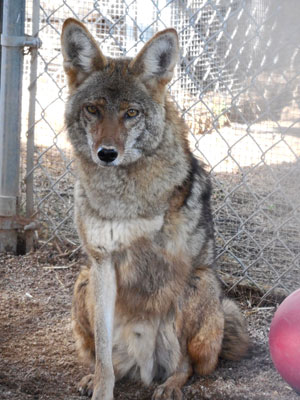 Sky coyote was our chosen foster parent. Sky is no youngster; he’s an older coyote, who came to SWCC after being caught in a leg hold trap. As a result he’s missing a front leg. Coyotes are known to be devoted parents, and both the male and female help to raise youngsters. But could Sky handle five busy puppies? Will they be safe with him? The puppies were kept in a dark, quiet place and grew fat from their frequent bottle feedings. Nature sounds played on noise machines and people masked their human appearance. No talking, no cuddling. Weeks passed, and finally, they were weaned and eating solid foods. It was nearly time! Sky’s enclosure had been doubled in size, and a divider and gate installed. Trail cameras would record the first few days of interactions through the fence. What would happen?
Sky coyote was our chosen foster parent. Sky is no youngster; he’s an older coyote, who came to SWCC after being caught in a leg hold trap. As a result he’s missing a front leg. Coyotes are known to be devoted parents, and both the male and female help to raise youngsters. But could Sky handle five busy puppies? Will they be safe with him? The puppies were kept in a dark, quiet place and grew fat from their frequent bottle feedings. Nature sounds played on noise machines and people masked their human appearance. No talking, no cuddling. Weeks passed, and finally, they were weaned and eating solid foods. It was nearly time! Sky’s enclosure had been doubled in size, and a divider and gate installed. Trail cameras would record the first few days of interactions through the fence. What would happen?
Sky did what coyote fathers have always done – he fed the puppies. He began to eat and regurgitate food up against the dividing fence. Perfectly natural coyote behavior!
After a few days the gate was opened. We held our breath as Sky was mobbed by a herd of young, excited puppies. At first, Sky may have regretted volunteering for this position, but he and the puppies quickly settled into family life. Now if Sky sees anyone coming down the row, he grumbles and huffs.
Badger Kits – 'Tag You're It'
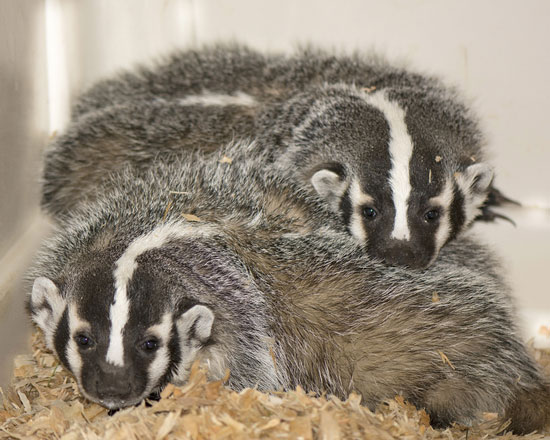 It started as a harmless game of tag between a brother and sister. Engaged in their game, they were unaware of the trucks and cars whizzing around them. Luckily for them, a veterinarian saw two small animals in the road ahead of her playing Russian roulette with the morning traffic. As she slowed down to avoid hitting them, she was shocked to see they were baby badgers!
It started as a harmless game of tag between a brother and sister. Engaged in their game, they were unaware of the trucks and cars whizzing around them. Luckily for them, a veterinarian saw two small animals in the road ahead of her playing Russian roulette with the morning traffic. As she slowed down to avoid hitting them, she was shocked to see they were baby badgers!
Ordinarily, you should leave baby animals alone, as their mother is likely close by. However, these two were facing certain death on the asphalt. She pulled over and called a friend who lived close to the scene and also happens to be a game warden. He came and scooped up the two kits and drove them to SWCC.
Arriving at the rescue site in search of their mother, we discovered that she had dug her den adjacent to the busy road. As her kits began to explore outside the den, they soon found themselves right on that road. SWCC staff set up a trail camera and a humane trap at the den site in an attempt to catch mom and reunite the family. Unfortunately, we never saw any signs of mom and wondered if she herself had been killed by a vehicle.
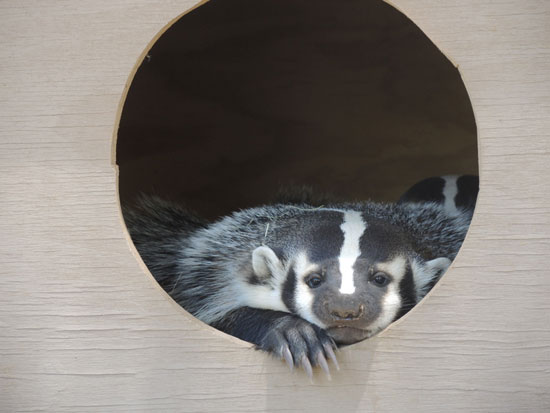
At first, these babies had to be fed by staff. It is not everyday, we get vocal little rascals like these. It wasn’t long before they started to eat on their own and were moved to a large outdoor enclosure. In this quiet and secluded space, they will stay wild and learn to hunt mice and rats.
Both will be released in the fall, far away from traffic and development where they can resume their game of tag safe and sound.
These are just a few of the faces you, our donors, have helped SWCC to save. Because of you, SWCC is here for our wildlife 24/7/365. Because of you, these animals are safe. There are thousands more untold stories as a result of your support of Southwest Wildlife Conservation Center.
Wild animals arrive needing our help nearly every day. We nurse the sick back to health, heal the broken, and raise the orphans. For those with no hope, we end their suffering. We also care for many wild animals that have suffered cruelty at the hands of people. Some have been taken out of the wild while others have been purchased from breeders. Many are declawed and have their canine teeth pulled in an effort to make them better pets. Far too many are kept in small, indoor cages like a novelty to show off.
Without you, and your financial support, there will be no more untold stories. Without you, we cannot be here for wildlife in need. We thank you for your continued support.
Wild about wildlife? To join our Wild Family and become a monthly donor,
www.southwestwildlife.org | Wildlife Clinic/Emergencies: 480-471-9109
Wildlife Education/Tours: 480-471-3621



